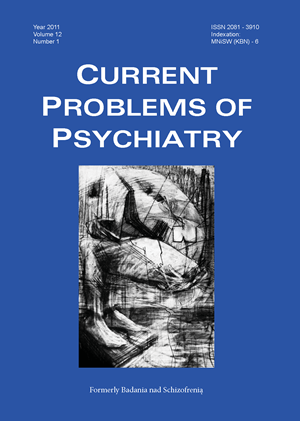Family relations and intensification of eating disorders in men
Keywords:
eating disorders, family relations, meanAbstract
The aim of the presented work is to provide answers to the following research questions: whether and what kind of relationships are taking place between the relations in family and the symptoms of eating disorders in men.
Methods and the examined group: While carrying out the research subsequent tools were used: Personal Survey of selfconstruction, Questionnaire Diagnosing Eating Disorders in Men created by Beata Pawłowska and Zofia Stankiewicz, as well as the Inquiry form designed to study disturbed relations within family by Beata Pawłowska and Emilia Potembska. The investigation included a group of ninety men, students of Medical University of Lublin. The average age of the examined subjects was 22. Seventy eight students were city residents whereas 12 - the residents of countryside. Thirty eight people were raised in a two-parent family and 52 were brought up in a single-parent family. Parents of 47 students were divorced and for 5 people the reason of growing up in a single-parent family was the death of one parent. Psychoactive agents were used by 33 men; alcohol was abused by 36 men. Self-mutilation was inflicted by 7 men. The abuse of alcohol by a member of family was declared by 20 students, while 13 men reported nutrition disorders by a member of family.
Results: Pearson’s correlation coefficients estimated between items of the Questionnaire investigating family relations and scales of the Questionnaire studying men’s eating disorders revealed significant statistical relationships between disturbed relations with parents of the examined students and the intensification of symptoms of bigorexia, the negative image of own body and overeating.
Conclusions: 1. The lack of acceptance and understanding from mother and father, the experience of emotional violence as well as the conviction that only illness can attract their attention and time, coexist with the addiction to physical exercises and pursuit to extend muscle mass by men. 2. The experience of emotional violence in a family, the lack of understanding and acceptance from parents, the feeling of helplessness, solitude in a family, escalated fear of adult life, as well as, the belief that time, love and attention of parents is only obtained by ill children is combined with the negative image of own body and the excessive eating in the situation of stress, feeling of aggression, sadness and loneliness.
References
1. Hanna A.C., Bond M.J. Relationships between family conflict, perceived maternal verbal messages and daughters disturbed eating symptomatology. Appetite, 2006; 47(2): 205-211.
2. Iniewicz G., Józefik B., Namysłowska I., Ulasińska R. Obraz relacji rodzinnych w oczach pacjentek chorujących na anoreksję psychiczną- część II. Psychiatr. Pol., 2002; 34(1): 65-81.
3. Jakubczyk A., Żechowski C., Namysłowska I. Jadłowstręt psychiczny– różne postacie, różne terapie. W: Bomba J., Józefik B. red., Leczenie anoreksji i bulimii psychicznej: co, kiedy, komu. Biblioteka Psychiatrii Polskiej; Kraków: 2003, s. 47-53.
4. Józefik B. Modele rodzinne a anoreksja psychiczna. Część I. Funkcjonowanie rodziny pochodzenia pacjenta. Psychiatr. Pol., 1999; 33(6): 861-875.
5. Józefik B. Modele rodzinne a anoreksja psychiczna. Część II. Wzory i przekazy międzypokoleniowe. Psychiatr. Pol., 1999; 33(6): 877-886.
6. Józefik B. Wzory międzypokoleniowe w rodzinach pacjentów z za-burzeniami odżywiania się i w rodzinach pacjentów chorujących na schizofrenię. Psychiatr. Pol., 2001; 35(3): 399-415.
7. Józefik B. Terapia rodzin w leczeniu zaburzeń odżywiania się. W: Bomba J., Józefik B. red., Leczenie anoreksji i bulimii psychicznej: co, kiedy, komu. Biblioteka Psychiatrii Polskiej; Kraków: 2003, s. 81-91.
8. Józefik B. Relacje rodzinne w anoreksji i bulimii psychicznej. Wydawnictwo Uniwersytetu Jagiellońskiego; Kraków: 2006.
9. Józefik B., Iniewicz G., Namysłowska I., Ulasińska R. Obraz relacji rodzinnych w oczach rodziców pacjentek chorujących na anoreksję psychiczną – część I. Psychiatr. Pol., 2002; 34(1): 51-64.
10. Weber G., Stierlin H. Familiendynamik und Familientherapie der Anorexia nervosa - Familie. Meermann R. Hrsg. Anorexia Nervosa. Schattauer; Stuttgart: 1981, s. 108-115.
11. Vanderlinden J., Norré J., Vandereycken W., Meermann R. Die Behandlung der Bulimia nervosa. Schattauer; Stuttgart: 1992.
12. Walewski P., Winnicka E. Bicepsem jestem. Polityka - nr 16 (2294) z dnia 2001-04-21; s. 3-9.
13. Pawłowska B., Rzeszutko E., Potembska E. Właściwości psychometryczne Kwestionariusza do Badania Zaburzeń Odżywiania u Mężczyzn (KBZOM). Curr. Probl. Psychiatry, 2011; 12(1): 82-88.
14. Pawłowska B., Potembska E. Właściwości psychometryczne Kwestionariusza do Badania Zaburzonych Relacji w Rodzinie (KBZRR). Curr. Probl. Psychiatry, 2010; 11(3): 119-126.
Downloads
Published
Issue
Section
License
Copyright (c) 2011 Authors

This work is licensed under a Creative Commons Attribution-NonCommercial-NoDerivatives 3.0 Unported License.


